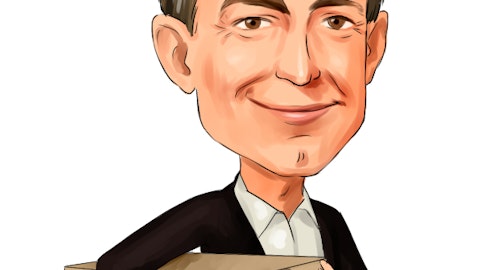Hedge Fund Billionaire David Tepper’s Stock Market Advice in 2010 Worked All Decade (CNBC)
Two years after the collapse of Lehman Brothers in the 2008 financial crisis, hedge fund billionaire David Tepper made a bold market call on CNBC about the power of the Federal Reserve that made investors money all decade. Central banks here and around the world have kept interest rates very low — and in some places, Europe and Japan, rates have gone negative. U.S. stocks have been the beneficiaries, propelling equities from their March 2009 lows to their longest and best-performing bull market ever.
Watch Billionaire Michael Platt Tell Cabbie About His Wealth (Bloomberg)
In a seemingly spontaneous conversation with self-proclaimed “cabbie to the stars” Manny Anzalota, Michael Platt, the billionaire hedge fund manager, told his driver that he’s “the highest-earning person in the world of finance…In the world.” Bloomberg’s Alix Steel reports on “Bloomberg Daybreak: Americas.” (Source: Bloomberg).
Hedge-Fund Billionaire Dan Och Buys $95 Million Home on Central Park South (MansionGlobal.com)
Billionaire investor Daniel Och is the buyer behind one of the most expensive apartments ever sold in New York City, according to people familiar with the deal. Mr. Och paid roughly $95 million for the penthouse unit as well as a smaller unit on a lower floor of the building, located at 220 Central Park South. The Wall Street Journal originally reported that the deal had closed for $100 million but it recorded for a slightly lower price, perhaps in part due to closing costs not reflected in the filing, said one person familiar with the deal.

Luis Louro / shutterstock.com
Soros Hires Senior Fund-of-Funds Pro (HFAlert.com)
Soros Fund Management has hired a high-profile professional away from UBS to oversee its investments with outside fund managers, an area where the firm has reduced its exposure. Betty Chen starts in Soros’ New York office on Jan. 2, assuming oversight of an undisclosed amount of allocations across external hedge funds, private equity funds and real estate funds. She had been leading research for UBS Hedge Fund Solutions, which ranks among the world’s largest hedge fund-focused fund-of-funds operators. UBS Hedge Fund Solutions was managing $37.1 billion on Sept. 30. Its staff of 100-plus runs a robust program that includes seed-capital, acceleration-capital and co-investment deals, while using the bank’s heavyweight status to secure lower fees from the underlying managers.
Renaissance Employees Could Face Clawbacks Over Hedge Fund’s Tax Maneuver (The Wall Street Journal)
Jim Simons’s Renaissance Technologies LLC has produced the greatest investment returns of any hedge fund. Now, it also may be facing an unusually painful tax headache. Last week, Renaissance sent a letter to its current and former employees warning that the Internal Revenue Service could force them to pay back taxes and penalties because they invested in Renaissance’s hedge funds through the firm’s 401(k) plan and individual retirement accounts, or IRAs, without paying fees.
The Healthy Organism of the Nordic HF Industry (Hedge Nordic)
Stockholm (HedgeNordic) – When asked to highlight some unique features of the Nordic hedge fund industry, we most often point out that the industry houses several of world’s largest CTA managers and also comprises a strong pool of fixed-income hedge funds (mostly Danish but not only). Judging by the statistics provided by the HedgeNordic database, the group of Nordic fixed-income hedge funds is in a very solid and healthy state, especially when comparing to the broader industry. There are a couple of data points backing this statement.
Stanley Druckenmiller Is Embracing Risk Again, Just ‘Timidly’ (Bloomberg)
Timid isn’t how most people would describe Stanley Druckenmiller. Yet that’s how he describes himself today. It’s not that Druckenmiller has sworn off taking risk. He owns copper and U.S. and Japanese equities, and he’s wagering on the Canadian and Australian dollars while shorting the yen and long-dated Treasuries — all positions that should profit in a stable-to-growing global economy. And in recent weeks, anticipating a pro-Brexit vote in the U.K., he bought the pound and banks including Barclays Plc and Lloyds Banking Group Plc. Only he wishes he’d been bolder.
Are Hedge Funds Too Conservative and Risk Shy? (HedgeWeek.com)
A recent white paper I read from Willis Towers Watson (Willis) suggests that the level of alpha and the volatility of alpha are at their lowest levels. The paper – Hedge Funds: A New Way – ultimately goes on to make a positive case for why hedge funds remain integral to investors’ portfolios but it is interesting to think, for a moment, as to why alpha levels are so low. The data set used by Willis Towers Watson covered a period from 1993 to 2018. It found that the highest levels of rolling monthly alpha occurred between 1993 and 1998, while the lowest occurred from 2012 to 2018. Is this part of a longer-term trend of subdued returns as public markets continue to shrink? Or, like all financial markets, is this a temporary cycle that hedge funds will break out of?





